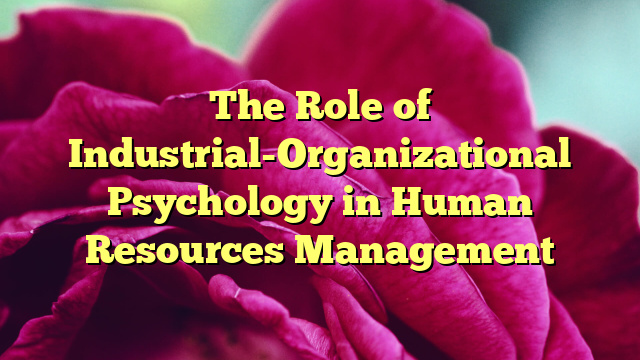The Role of Industrial-Organizational Psychology in Human Resources Management
The Role of Industrial-Organizational Psychology in Human Resources Management
Introduction
Industrial-Organizational (I-O) psychology is a field that focuses on applying psychological principles and theories to the workplace. It plays a crucial role in human resources management by helping organizations improve their hiring processes, enhance employee performance, and create a positive work environment. This article explores the various ways in which I-O psychology contributes to effective human resources management.
1. Selection and Hiring
One of the primary areas where I-O psychology is utilized in human resources management is in the selection and hiring process. I-O psychologists develop and implement assessment tools, such as interviews, tests, and simulations, to identify the most suitable candidates for a job. These tools help organizations make informed decisions and reduce the risk of hiring individuals who may not be a good fit for the role or the company culture.
Additionally, I-O psychologists also conduct job analyses to identify the key competencies and skills required for a particular position. This information is then used to develop job descriptions and job specifications, which serve as the foundation for effective recruitment and selection strategies.
2. Training and Development
I-O psychology also plays a crucial role in designing and implementing training and development programs for employees. By conducting needs assessments and analyzing performance gaps, I-O psychologists identify the specific areas where employees require training and development interventions.
They then design training programs that are tailored to the needs of the organization and its employees. These programs may include workshops, seminars, e-learning modules, or on-the-job training. The goal is to enhance employee skills, knowledge, and abilities, ultimately improving their performance and productivity.
3. Performance Management
Performance management is another area where I-O psychology contributes to effective human resources management. I-O psychologists develop performance appraisal systems that provide objective and reliable measures of employee performance. These systems help organizations identify high-performing employees, as well as those who may require additional support or development.
Furthermore, I-O psychologists also assist in setting performance goals and standards, providing feedback and coaching to employees, and designing reward and recognition programs. By implementing effective performance management practices, organizations can motivate employees, improve job satisfaction, and foster a culture of continuous improvement.
4. Organizational Development
I-O psychology also plays a vital role in organizational development, which focuses on improving the overall effectiveness and efficiency of an organization. I-O psychologists conduct organizational assessments to identify areas of improvement, such as communication, teamwork, leadership, and organizational culture.
Based on the assessment findings, I-O psychologists develop interventions and strategies to address these areas. This may involve implementing changes in organizational structure, redesigning work processes, or enhancing leadership development programs. The goal is to create a positive work environment that promotes employee engagement, satisfaction, and productivity.
5. Work-Life Balance and Well-being
In recent years, there has been an increased focus on work-life balance and employee well-being. I-O psychology plays a crucial role in addressing these issues and promoting a healthy work environment.
I-O psychologists conduct research and develop interventions to reduce work-related stress, improve work-life balance, and enhance employee well-being. They may implement flexible work arrangements, provide stress management programs, or promote employee wellness initiatives. By prioritizing work-life balance and well-being, organizations can improve employee satisfaction, retention, and overall organizational performance.
Conclusion
Industrial-Organizational psychology plays a significant role in human resources management by applying psychological principles and theories to the workplace. From selection and hiring to training and development, performance management, organizational development, and work-life balance, I-O psychology contributes to creating a positive work environment and improving employee performance and productivity. By leveraging the expertise of I-O psychologists, organizations can enhance their human resources practices and ultimately achieve their business goals.

